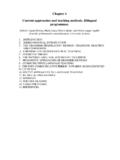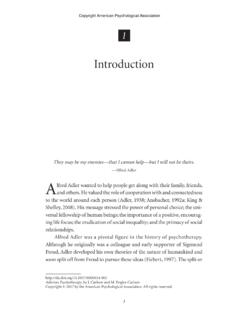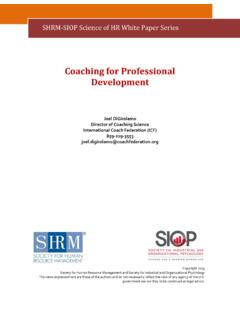Transcription of Lesson 1. THE NATURE and SCOPE OF PSYCHOLOGY LESSON …
1 LESSON 1. THE NATURE and SCOPE OF PSYCHOLOGY . LESSON AIM. Define PSYCHOLOGY and explain basic theoretic approaches Despite their interest in the subject, students of PSYCHOLOGY often find it difficult to answer this basic question in a clear, concise and specific manner. Some might say that PSYCHOLOGY is a study of "human behaviour"; some might say it is a study of the "mind or brain"; others might say that it is a study of personality and what motivates people to do what they do. All are partly correc t, but each of these answers is focused on only some aspect of PSYCHOLOGY . It is now generally agreed that PSYCHOLOGY is a science. Definition Science Objective study.
2 Definition Psychologists study Behaviour The observable actions of a *Behaviour person/animal. Behaviour includes being kind, angry, breathing, walking, aggressive, getting old, becoming a grandparent and so on. *Experience If we study behaviour, we need to understand what the experience of that behaviour is like for the individual. Ie. If we study someone being angry, we need to know what that feels like for the person. *Human and animal behaviour often psychologists can not perform experiments on humans for ethical reasons and may use animals to try to gain understanding of human behaviour. For example, by trying to teach monkeys to talk, researchers have gained insight into how humans may develop their language skills.
3 As PSYCHOLOGY is a science, - it is vital that it can be studied scientifically and objectively. We can study, experiment with and objectively talk about manifest behaviour. However, the experience of that behaviour is a subjective experience, where we rely on the individual to tell us how it feels. Definition Subjective Usually used to refer to something existing inside oneself and not capable of being experienced by others. This contrasts with Objective dealing with facts in a way that is unaffected by feelings or opinions. Positivism - A philosophical doctrine that scientific knowledge is limited to observed fact and experience. Manifest Expressed or observable.
4 Therefore, a generally accepted definition of PSYCHOLOGY is "the study of human behaviour. Behaviour can provide us with valuable windows into a person's emotional and cognitive states, and if we can understand the psychological influences on behaviour, we can try to better understand a person's inner experience. BUT IT'S ALL COMMON SENSE ISN'T IT? Many people argue that PSYCHOLOGY is just common sense. Many people will say things like someone behaves like this because of that we are all armchair psychologists . But how do we know that what we are saying is correct? This is the starting point that psychologists use when studying human behaviour. A good example is the murder of Kitty Genovese.
5 She was stabbed to death in the middle of a busy residential area of New York. Thirty-eight witnesses saw the attack and none of them did anything to intervene, not even to phone the police. Why? The common sense answer might be that they didn't care, that they were callous individuals. Darley and Latane (1968) carried out research into why the witnesses did nothing. They arranged for students to discuss personal problems over an intercom. Only one actual student was involved the others were confederates (ie. working with the researchers, pretending to be students). During the conversations, a confederate would appear to have an epileptic seizure. If the real student thought that five other people were also listening to this person have a seizure, it took them three times as long to react as if they thought there were only two people in the discussion.
6 This suggests that in emergency situations, if we think lots of other people are involved, we may be less likely to do anything we think someone else will. This is called bystander apathy. Definition Bystander Apathy The tendency of people in social situations not to help strangers in an emergency. The more bystanders there are, the greater the apathy, as responsibility is perceived as not belonging to one individual. Apathy - Listlessness, passiveness. So when you consider this, if psychologists had not carried out this research, the overriding view would be that New Yorkers did not care that a woman was being murdered. DIFFERENT approaches TO THE STUDY OF HUMAN BEHAVIOUR.
7 There are many different theories and models within PSYCHOLOGY which try to explain our behaviour, emotion and thoughts. Each theory contributes something different and increases our understanding. Therefore, basically psychologists start out with a hypothesis or idea, which they then test. This idea is the basis for empirical research. Definition Model - 1) A way of representing patterns of relationships in human behaviour. Or 2) In social PSYCHOLOGY , a person whose behaviour is closely observed. Theory - A set of assumptions advanced to explain existing phenomena and predict new events. Paradigm - Representation or model of reality. Hypothesis Explanation for observed data that has still to be tested.
8 Hypothesis testing Gathering information and testing alternative explanations of certain phenomena. Empirical A finding based on experience or observed evidence, the basis for experimental science. Neurobiological approach Some psychologists maintain a close link with the discipline of physiology: they perceive the brain and nervous system as the main key to human behaviour, and tend to study the relationship between psychological events (what happens in the mind) and biological events (what happens in the body). Many neurobiologists believe that thought and feelings result from the actions of nerves and the nervous system in the body. For instance, they argue that dreams are the result of activated neurological patterns or random firing of nerve cells.
9 Behavioural approach Another fairly conservative approach is that of behaviourist psychologists. The founder of this school of thought, J. B. Watson, was the father of the science of PSYCHOLOGY (though not of the study of PSYCHOLOGY ). He argued that if PSYCHOLOGY was to be scientific, it must focus exclusively on human behaviour. Watson did not think psychologists should speculate on the unobservable workings of our minds, as they could not be studied scientifically. Watson's approach still has a strong following due to its practical applications, eg. In reducing phobias and so on. Definition Stimulus - Sensory input which leads to a response. Response - The behavioural result of stimulation in the form of movement or glandular secretion.
10 Much of behavioural research is executed with subjects under experimental conditions, using a stimulus- response approach. The psychologist provides a stimulus for an individual, then observes and studies the individual's response to that stimulus. Behaviourists are sometimes referred to as "black box" theorists because they treat the mind like a clean slate that has attitudes and behavioural patterns inscribed on it due to learning. The behaviourist approach has been used extensively in studying the process of learning. Cognitive approach Definition Cognitive comes from the Latin cognito, meaning to Cognition- A general term including all mental Apprehend or understand.









